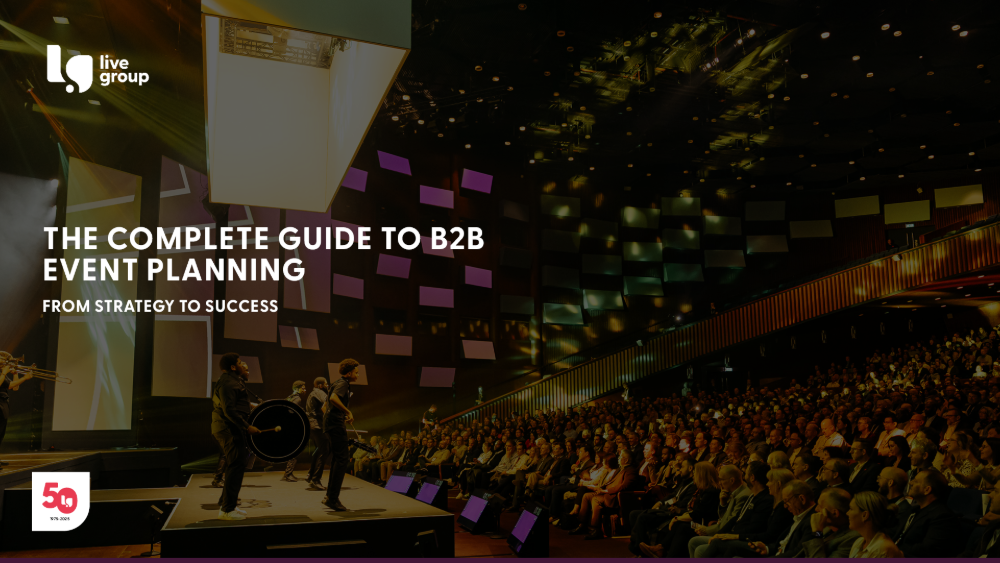Regardless of whether your event is small hybrid workshop or a multi-day virtual summit, your event website acts as the front door to the whole experience.
Everyone assumes event websites are easy until they’ve spent three hours fighting with a page builder because the schedule won’t behave.
There are plenty of tools that promise you can “launch your virtual event website in minutes.” Some can. Many can’t. And most will get you only halfway, especially when hybrid audiences, personalised agendas, and digital engagement come into play.
So how do you build an event website that actually does its job? And what’s the difference between “good enough” and “built-for-purpose”?
Let’s go through it step by step, with a mix of technical detail, honest trade-offs, and the reality that sometimes, handing things to a specialist agency is the only way to get something that genuinely delivers for your delegates.
What Is an Event Website?
It sounds obvious, but the phrase gets thrown around for everything from a single-page sign-up form to a fully immersive digital venue.
At its core, an event website does one or more of the following:
- Tells people what’s happening
- Encourages them to register
- Gives them the tools to navigate the event
- Helps them take part – whether they’re at home, on-site, or somewhere in between
But the scope varies wildly depending on the type of event you’re running.
Some teams only need a simple event registration website for a one-day session. Others need a hybrid event website packed with personalised schedules, livestreams, polls, breakout rooms, and analytics that actually mean something. And then there’s the world of fully virtual event websites, where your site is the venue.
If that sounds like three totally different animals, it’s because they are.
Which Type of Event Website Do You Actually Need?
Is a Simple Event Registration Website Enough?
If your event is:
- One day
- One location
- One audience
- One registration path
Then a simple event registration website can work well. Think community meet-ups, local seminars, internal briefings.
This sort of site usually includes:
- A single landing page
- Basic event info
- A registration form
- A confirmation email
For this use case, Squarespace, Wix, Webflow, or a well-built WordPress page can handle this. Tools like Eventbrite and Eventin (for WordPress) can be solid add-ons if you want basic ticketing.
The rule of thumb is: a straightforward site is perfectly fine when the event itself is straightforward.
B2B Event Planning Guide 2025
Download the 2026 B2B Event Planning Guide
Do You Need a Bespoke Marketing-Led, Multi-Page Event Website?
If your event is even slightly more complex, with multiple sessions, speakers, locations, registration types, sponsors, you’re likely moving into the territory of a more bespoke, marketing-led event website.
These sites usually need:
- Speaker profiles
- Travel and accommodation details
- Day-by-day schedules
- FAQ sections
- Sponsor pages
- Forms and calls to action throughout
This is where tools like Webflow or WordPress can still work, but you’ll start noticing the cracks: the time investment required, the fiddly nature of schedule creation, and the lack of proper data integration.
Seasoned conference organisers often warn that general website builders aren’t designed for the “moving parts” of large events, particularly schedules and multi-track programmes.

Do You Need a Hybrid or Virtual Event Website?
This is where things get interesting.
A hybrid event website typically needs:
- Livestream integrations
- Virtual breakout rooms
- Chat, Q&A, and polling
- Accessible on-demand content
- Personalised agendas for delegates
- Proper security (not “password-protected page” security)
A virtual event website might need even more:
- Digital environments
- Networking tools
- Interactive agendas
- Attendee-to-attendee messaging
- Multi-session live production
- Analytics good enough to share with stakeholders
At this level, DIY platforms can start to fall apart. Even if you manage to “make it work,” it rarely works gracefully.
And that’s the moment many teams turn to a professional live events agency, because the stakes become too high for a website that’s cobbled together with plugins and prayer.
What Tools Can You Use to Build an Event Website Yourself?
Here’s a quick snapshot of the DIY landscape:
Squarespace / Wix
Good for: Simple events, fast turnaround
Weak spots: Schedules, complex registration, integrations
WordPress + Plugins (Eventin, The Events Calendar, etc.)
Good for: Flexibility, customisation
Weak spots: Maintenance, plugin conflicts, security
Webflow
Good for: Beautiful designs, more structured builds
Weak spots: Still manual for schedules, registration, and hybrid features
Event SaaS tools like Eventbrite
Good for: Easy ticketing, quick rollouts
Weak spots: Limited design control, not built for hybrid
Specialist conference builders (Spiny Events, Landingi, Conference Manager, etc.)
Good for: Mid-level complexity, faster schedules, speaker pages
Weak spots: Often generic, limited personalisation
These solutions all work, but sometimes the event still requires something they weren’t built to handle.
Why Do Many Teams Eventually Choose a Specialist Agency For Their Event Website Instead?
Because hybrid and virtual events aren’t just about having a website.
They’re about building a digital experience that supports:
- Multiple audience types
- Data capture that means something
- Content that adapts to user behaviour
- Smooth production
- Branding that feels intentional
- A level of personalisation that fosters engagement
That’s where a specialist agency steps in, not just to build pages, but to build the entire journey.
How Can an Agency Like Live Group Build the Ideal Event Website?
Here’s where Envoku by Live Group comes into the picture.
Envoku isn’t “just another event website builder.”
It’s a platform designed by an events agency that’s been delivering complex hybrid and virtual experiences for years.
Rather than forcing your event to fit into a cookie-cutter platform, Envoku adapts to:
- Your event structure
- Your audience’s learning styles
- Your content requirements
- Your registration flows
- Your security needs
- Your personalisation goals
If you want a hybrid event website where the agenda changes dynamically based on a delegate’s personality profile? Envoku does that.
If you need a virtual event platform where every attendee’s content journey feels tailored, not generic? Envoku handles that too.
If your senior stakeholders care about analytics that show actual engagement, that’s part of the platform’s foundation.
And because it’s delivered by the Live Group team, the digital side connects naturally to:
- On-site delivery
- Production
- Comms strategy
- Stakeholder management
- Audience engagement expertise
You get one team, one ecosystem, and a site that’s engineered for your event beyond just having a page with your logo pasted on top.
What Should Any Good Hybrid or Virtual Event Website Include?
Regardless of who builds it, you should expect:
1. Clear navigation
Attendees shouldn’t be hunting for information like it’s a treasure map.
2. A strong hero section
This is where the “Register now” or “Join today” button earns its keep.
3. A schedule that actually works
Not a PDF. Not a static image. A real-time, interactive schedule.
4. Integrated registration
Not “click here and hope for the best.”
5. Personalised content pathways
Especially for hybrid events where audience needs vary wildly.
6. Accessibility built in from the start
Not bolted on at the end.
7. Broadcast-quality streaming (for hybrid/virtual events)
Your website shouldn’t be the weakest link on the day.
8. Real analytics
Not vanity metrics – unique audience profiles and real stats for ROE (return on engagement).
If anything on this list feels intimidating, that’s the point: a proper hybrid or virtual event website is more complex than it looks.
Event Platforms: Should You DIY or Work With a Specialist Agency?
Here’s the honest framework:
DIY is fine when:
- Your event is small or simple
- You have time to maintain the site
- Personalisation isn’t essential
- You’re not mixing online and on-site audiences
An agency is better when:
- Your event is high-profile
- Engagement matters
- You need hybrid or virtual delivery
- You want premium branding
- You need reliable analytics
- You can’t risk technical glitches
- You want your website to actually support the event experience
In other words: DIY for small. Agency for impact.
Final Thoughts: What’s the Smartest Way to Build Your Event Website?
Most event planners start with the same question:
“What’s the best tool for building a hybrid or virtual event website?”
But the real question is:
“What experience do we want delegates to have, and what infrastructure do I need to create it?”
If you’re running something simple, go ahead with a lightweight site builder. It’ll get the job done.
But if you’re planning a hybrid, virtual, or high-stakes event, where the website does far more than display information, your safest and smartest route is to work with specialists who build these platforms every day.
Download the B2B Event Planning Guide for the complete playbook to planning events in 2025-26

Ready to take the stress out of event planning?
Chat to us today about how our delegate management services can help bring your next event to life – on time, on budget, and beyond expectations. Whether you need full-scale delivery or targeted support, Live Group is here to help.





